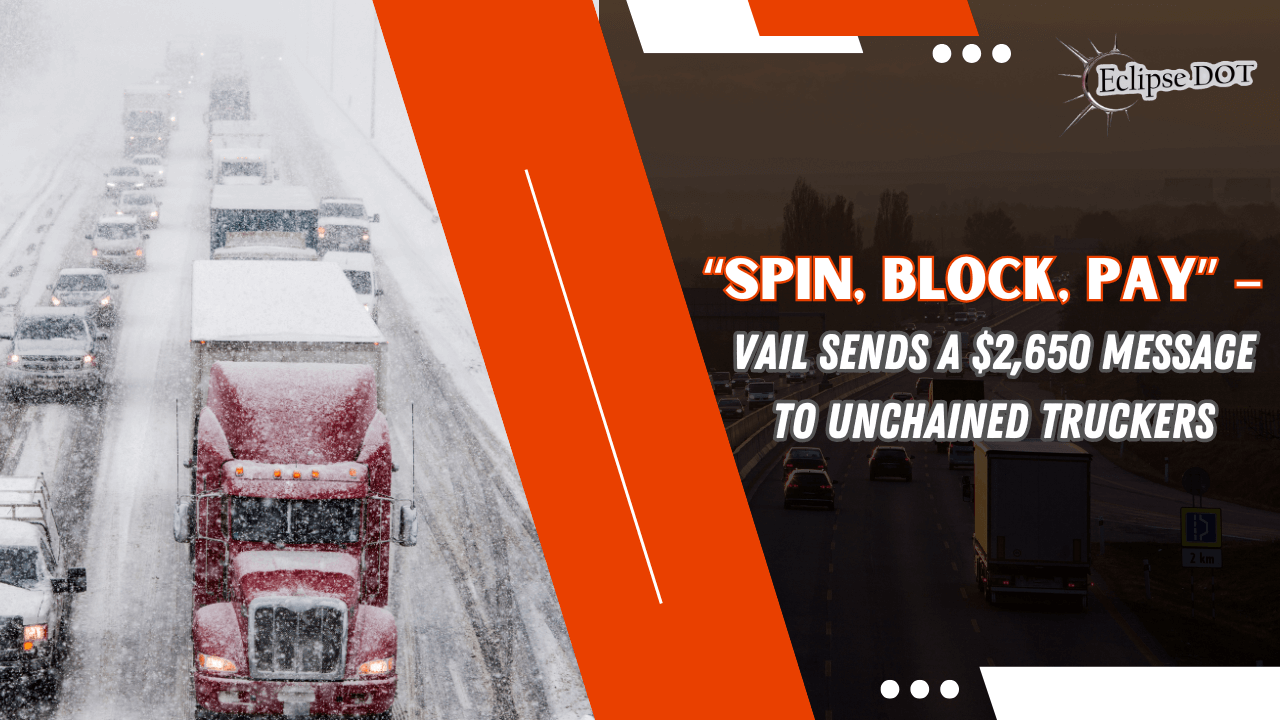Alright, buckle up because Vail, Colorado just flipped the script on winter driving — and if you’re not chained up when the snow hits the fan, you’re about to get smacked with a fine that’ll leave a dent in more than just your wallet. This isn’t just another warning. It’s the start of a new chapter in enforcement that every commercial driver needs to understand.
⛓️ New Ordinance Alert: Chain Up or Pay Up
On March 18, the Vail Town Council passed a brand-new ordinance designed to send shockwaves through the trucking community. If you’re caught spinning out on I-70 without chains during active chain law conditions, you’ll face a $2,650 fine. And this doesn’t just target big rigs — passenger vehicles are also looking at a $1,500 fine for failing to follow chain requirements.
This isn’t a bluff. Rather, it’s the maximum fine allowed by Colorado state law, and it sends a message that resonates through every mountain corridor: Comply or pay up.
Why This Ordinance Matters
This new rule isn’t about punishment — it’s about prevention. Spinouts and road closures caused by unchained vehicles create massive safety hazards, financial losses, and frustration for everyone trying to get where they need to go. By enforcing stronger penalties, Vail hopes to make non-compliance too expensive to ignore.
To add emphasis, the same night the ordinance passed, a semi jackknifed on I-70 just outside Vail Town Hall — no chains. Couldn’t have made their point any clearer.
🧊 Why Now?
Vail had reason to act. I-70 has been a mess.
As of March, Colorado saw over 200 closures between Glenwood Springs and Georgetown during the 2024–25 winter season. That’s a 40% increase over the previous year. Those closures added up to 161 hours of gridlock and an estimated $300 million in economic losses. In other words, this is more than inconvenience — it’s an economic drain.
Mayor Travis Coggin put it bluntly:
“If you don’t like the fine, don’t break the law.”
And honestly? He’s got a point.
🚔 Statewide Crackdown Already Underway
Vail isn’t acting in isolation. The Colorado State Patrol is already cracking down, running weekly chain law enforcement ops along the I-70 corridor. In one recent stretch:
📋 297 vehicles were pulled over
⚠️ 62 citations were issued
⛓️ 6 of those were specifically for chain law violations
So no, this isn’t just a Vail thing. In fact, the entire state is watching — and they’re done waiting for drivers to “maybe” do the right thing.
📊 The Ripple Effect of One Shutdown
Let’s go deeper on the impact of those I-70 closures. Each spinout isn’t just a headache — it’s a chain reaction that affects multiple industries and essential services:
- Freight delivery schedules — carriers lose time, money, and customer trust.
- Tourism and travel — stranded tourists = angry Yelp reviews.
- Emergency response teams — more risk, more delays, and more strain on limited resources.
- State budgets — each hour the highway’s closed is money out the window for Colorado.
Clearly, this isn’t about being strict — it’s about preventing chaos. Consequently, Vail’s stepping up to break the cycle.
📚 The History of Chain Laws in Colorado
Colorado’s chain law didn’t just appear overnight. It was born out of necessity. I-70 has long been one of the most heavily traveled and frequently shut-down mountain corridors in the country.
Years ago, closures due to unchained trucks were far too common, often resulting in serious crashes and days-long traffic delays. Because of these issues, the Colorado Department of Transportation (CDOT) developed chain laws to improve traction, reduce closures, and promote safety during harsh winter conditions.
Over the years, these laws have evolved. However, one thing hasn’t changed — non-compliance remains a problem. Vail’s new ordinance is the latest and loudest response to that ongoing challenge.
🧰 What Companies Should Do Right Now
Here’s the part every fleet manager, HR director, and safety coordinator should read twice. These steps can save your company thousands — and more importantly, protect your people.
Action Plan:
✔️ Send a winter compliance reminder to all drivers — with updated info about Vail’s new fines.
✔️ Audit every truck’s chain kit — don’t just assume they’re in there.
✔️ Create a weather monitoring plan — track storms, closures, and CDOT updates.
✔️ Include chain law training in onboarding — make it part of your new driver checklist.
✔️ Conduct practice chain-ups — yes, even your veteran drivers need refreshers.
Turn this list into a checklist. Print it. Email it. Post it in every dispatch room. Make it a culture.
🛑 Avoid These Common Chain Law Mistakes
Let’s have a little fun while we learn. These are the top excuses — and why they won’t save you from that fine:
❌ “I’ll just wait it out at the truck stop.”
(You and 40 other trucks, parked bumper to bumper, going nowhere fast.)
❌ “I’ve got chains… somewhere in the back…”
(If they’re rusted, tangled, or missing parts, they’re as useful as a screen door on a submarine.)
❌ “It’s just a little snow. I’ve driven through worse.”
(And now you’re blocking the pass. Again.)
Instead of excuses, opt for preparation. Chain up when the law says so — and you won’t have to explain yourself to an officer.
💭 Dan’s Take: Real Talk for the Road
Let’s be real. Nobody likes chaining up. It’s cold, uncomfortable, and your fingers turn to popsicles before you get to wheel three.
But what’s worse?
- Getting slapped with a $2,650 fine
- Blocking a mountain pass
- Becoming that guy who shuts down commerce, traffic, and the ski season for half the state
This ordinance isn’t about punishing truckers — it’s about protecting everyone on the road. It’s about keeping freight moving, tourists arriving, and lives safe. Vail’s just tired of being the ones cleaning up after someone else’s bad decision.
So, before you hit I-70 in winter, ask yourself:
Do I have chains?
Do I know the law?
Do I really want to be on the wrong end of this fine?
Because in Vail, the message is loud and clear:
Spin. Block. Pay.
Gain exclusive access to our CDL & DOT Compliance articles with a trial at DOTDocs.com. And don’t forget to claim your FREE micro audit at THE ECLIPSE DOT MICRO AUDIT. Ready for seamless operations? Discover the difference today!


